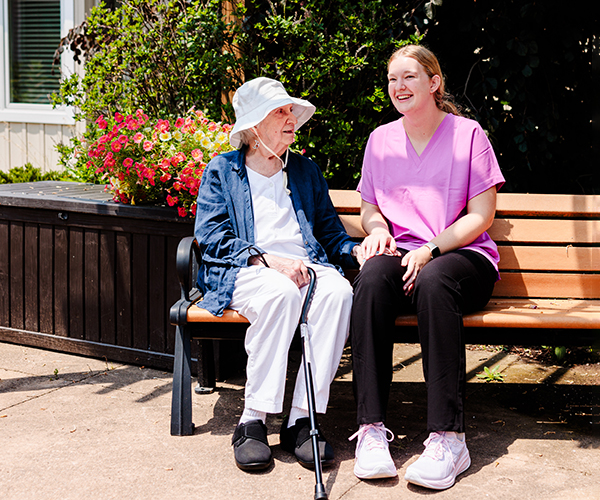Linda Brewer’s first waking thoughts could be sung by a chorus line of caregivers everywhere.
“Every morning, my first thought is my mother and what I have to do for her,” says Brewer, 55. She’s a retired Cleveland schoolteacher who lives in South Euclid — a short drive from where her mother, Margaret, sleeps in a medical bed and depends on a wheelchair rather than her atrophied legs. Mostly, 82-year-old Margaret depends on Brewer: her daughter and caregiver, her hope and her financial guardian.
“I think about her money,” Brewer says. “It is always her before me. And I try to make sure everything is secure and she is happy and cared for.”
After Brewer and her three siblings admitted their mother to a nursing home in September 2004, they learned how expensive it is to age.
Brewer’s mother stayed in the nursing home through December. In January, the bill came.
“It was $8,000!” Brewer says, still upset that no one at the facility told her that Medicare would stop paying for the $4,800 monthly bill after 60 days. “We had not a clue [that care] would cost that much.”
Brewer worked out a payment plan with the facility. She’s still paying, 16 months later. “What happens to people who can’t pay that bill?” she asks.
Like Brewer and her family, 80 percent of people do not plan for the cost of long-term care, says David Toetz, a Parma-based attorney who specializes in “elder law.” “The government is pushing all of us toward [funding] our own long-term care,” Toetz says.
This February, President Bush signed legislation that requires elders and their families to take more responsibility for the cost of nursing home stays. The law is meant to keep seniors from “protecting” their savings by giving away all their assets to their families, then leaning on the government to pay for long-term care. But because of the law, seniors have to plan large gifts to their families carefully. They also have more incentive than ever to plan for the cost of nursing-home care.
This frustrates many seniors who grew up with promises of pensions and Medicare. They saved frugally, spent discriminately. Now, many of them are writing checks for long-term care rather than passing their hard-earned assets to their children.
“When they hit that life-changing diagnosis, it totally depletes their savings and takes away their sense of security,” says Stacey Rokoff, director of the school for caregivers at Fairhill Center in Cleveland.
Aging is expensive, and the cost of care is overwhelming for a lot of families. More than half of the 155,000 Ohioans age 85 or older live in nursing facilities, according to the U.S. Census Bureau. Their long-term care price tags can add up to $70,000 per year, Toetz says.
The best way to cope is to create a long-term plan that balances gifts, practical spending and savings for long-term care. “Many wait until a spouse gets ill,” says Toetz. “It’s not too late to [plan], but in every case, there are things you can do earlier to protect your assets.”
•••
If seniors want to pass any of their assets on to family, a change in federal law gives them even more reason not to wait. If a senior runs out of money because of long-term assisted-living bills, any gifts and asset transfers he or she has made within the last five years may delay his or her eligibility for any new government aid.
Here’s why. As Linda Brewer discovered, Medicare, the national health plan for seniors, only pays for a few months of nursing-home coverage. After that, seniors have to fund their care themselves — unless they’ve almost run out of assets. If they’re down to $2,000, then Medicaid, the government health program for low-income Americans, kicks in.
In the past, some seniors have leaned on this safety net by giving away all their assets to their families in order to qualify for Medicaid. The new law is meant to prevent that. (Before, the government “looked back” at three years of gifts, not five.)
But the new rules can bite into seniors’ bank accounts when they least expect it. For example, if Grandma gives $20,000 to her son, then goes into a nursing home for long-term care four years later, the $20,000 counts as an asset as far as Medicaid is concerned — even if she has only $2,000 left in her savings account. She must continue to pay for her care until she “spends down” this $20,000. Meanwhile, her son may have spent the gift long ago.
“She would be ineligible for Medicaid for about five months,” Toetz says, dividing the $20,000 by $4,800, which by law is the cost of care per month. “Who is going to pay for [the care] during this time?” he asks. “Now the kids have to come up with the money for Grandma.”
That’s why such forward thinking is critical. Start writing checks while you’re healthy, Cooper says. “Do it now,” she says. “Don’t wait. If you want your children to have some of your assets, go ahead and gift each year.” First discuss with your financial adviser how much you can afford to give each year, Cooper adds. And transfer the deed on your home if you are already considering long-term care options.
Brewer is now the beneficiary on her mother’s checking account, and she accepted a gift from her mother’s savings. Also, the house deed was transferred to Brewer’s name. Still, she knows these steps will not matter if her mother must go back into nursing care within five years. “We couldn’t just leave [her assets] as they were, but we are aware that they are really not safe,” Brewer says.
•••
Financial planners can help seniors manage their assets so they can pay for their own nursing-home care — and, if necessary, handle that middle stage between Medicare coverage and Medicaid coverage in ways that don’t conflict with Medicaid’s strict rules.
Before a person can qualify for Medicaid, all assets — this means savings accounts, annuities and life insurance, which are considered cash — must be “spent down” to $2,000 for a single person to qualify for Medicaid, says Bonnie Cooper, regional Medicaid liaison at Harborside Healthcare in Westlake.
The smart way to spend down to qualify for Medicaid assistance — before going into a nursing home or after a spouse has done so — is to use savings to improve quality of life at home by making repairs or installing items such as grab bars or ramps. These practicalities won’t be held against a senior when they apply for Medicaid.
“If you have a 15-year-old car, buy a new one,” Toetz says. “If you need a new roof, get a new one. Get a new bathroom, get the doors widened, put handrails on the tub — spend your money on home improvements.”
Single people who have moved to a nursing home can still spend down on practical items. They can set money aside for funeral arrangements, another approved expenditure. They can also buy things for their room in the nursing facility, such as a lift chair or recliner, or clothes or other personal items.
Most importantly, keep all receipts, Rokoff reminds. “Talk to a financial adviser [during this process] and make sure you are dotting all of your I’s and crossing your T’s.”
Rokoff describes a woman who sold her parents’ home, then used that money to purchase a new home so the three of them could live together while she cared for them. Eighteen months later, her father needed nursing care.
“If you look at the picture from an objective view, it looks like she cashed in her parents’ house, bought a new one and lived under their finances,” Rokoff says. But that’s not the real story. “She used the money for her parents’ care,” Rokoff points out. That’s why it’s important to retain detailed records going back five years: to prove that expenditures and gifts were not made solely for the purpose of qualifying for Medicaid.
Cooper paints a picture of a typical client to better explain the spend-down process: Take “Rhonda,” 83. She kept her home but moved in with her daughter, who cared for her. Then, Rhonda’s health worsened, and after a three-day hospital stay, the daughter admitted her to a nursing home. Rhonda has a home, a life insurance policy, a checking account and a savings. Rhonda has secondary insurance through AARP. Medicare will pay for the first 20 days at the nursing home, and on the 21st day, Medicare will pay for 80 percent and AARP will cover the 20-percent co-pay. Rhonda can stay a total of 100 days with this assistance, as long as her health is improving.
Then, she must pay for the nursing home herself.
This is when Cooper meets with Rhonda’s family to review all assets. She makes a list, from the house to life insurance. If Rhonda is married, Cooper must combine both partners’ assets and split the pot. Rhonda’s 50 percent must be spent down.
Rokoff says all this spending is difficult for seniors who save for so long. “They want that money to be there for them as they age — it’s their cushion, their safety,” she says.
Draining assets is perhaps more difficult for family members, Cooper notes. Children may have check-writing privileges for their parents’ accounts, but the money doesn’t belong to them. “That cash has to go toward her care,” she says.
•••
Cooper says the best way to protect assets is to plan before long-term care is a necessity (see sidebar). “Don’t wait until Mom gets so bad that she has to go into a nursing facility,” Cooper says.
Of course, this doesn’t always happen. “We all live with this eternal hope and optimism,” Rokoff points out.
Perhaps one of the most frustrating aspects of managing finances for seniors is that life is unpredictable. Few elders expect that in four years they will need long-term nursing care.
Therefore, planning gifts and asset transactions before the five-year limit may seem overwhelming.
Now that Brewer is carefully managing her mother’s finances and has her mother’s power of attorney, she is thinking of herself, too. She made her sister the beneficiary of her annuities. “My mom’s situation was an awakening,” she says. “I need people to know what I have and where I want it to go if I ever need help.”
Rokoff suggests following Brewer’s example and appointing a financial point-person in the family. “Devise a Plan B,” she says. “You may not need the resources now, but you need to know where to turn when you are ready.”
How Can You Cope?
David Toetz, a Parma-based attorney who specializes in elder law, offers these pointers for smart long-term planning.
1. Ask an advisor. Meet with a financial advisor to discuss ways of making gifts and deed transfers, as well as ways to position your assets for maximum benefit. Various stocks and bonds products can provide a post-retirement income stream.
2. Update documents. Update your financial and health documents, including financial and health care powers of attorney, wills, and living wills.
3. Involve family. Discuss your wishes for long-term care with spouses, children or friends. Consider how you prefer to spend the end of your life -- in nursing care or at home. Talk about your life savings and where you want it to go.



